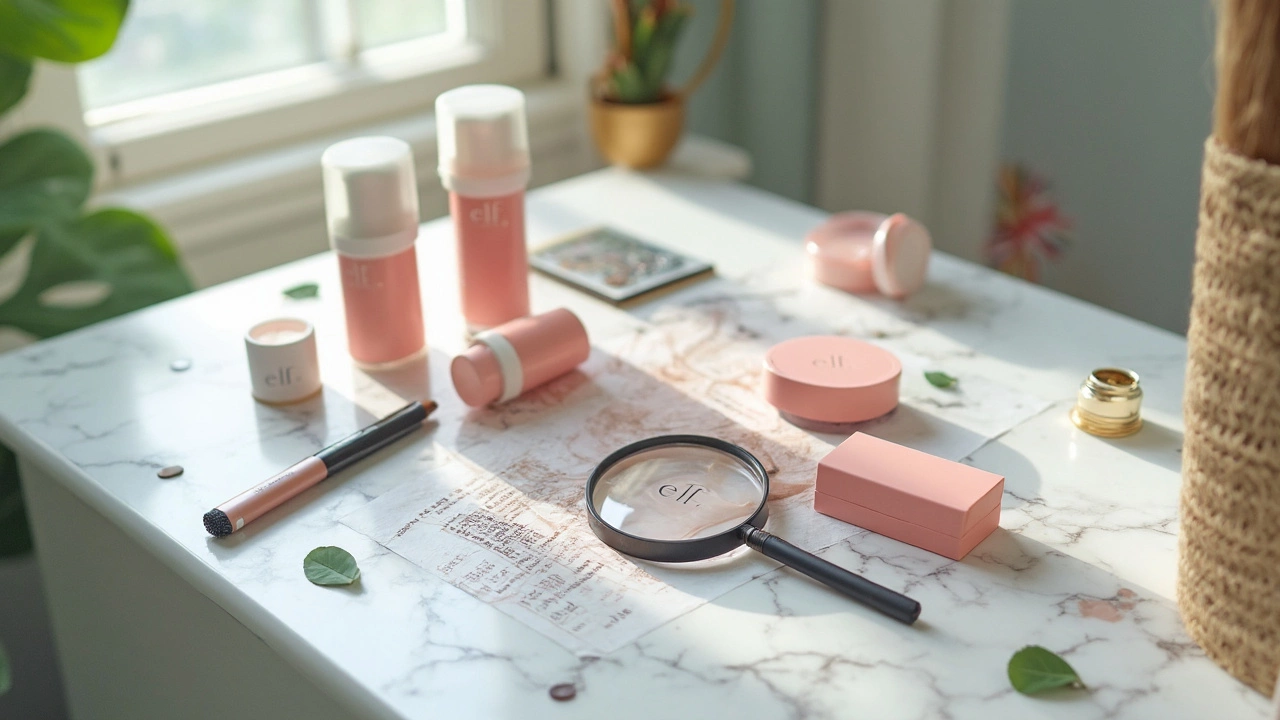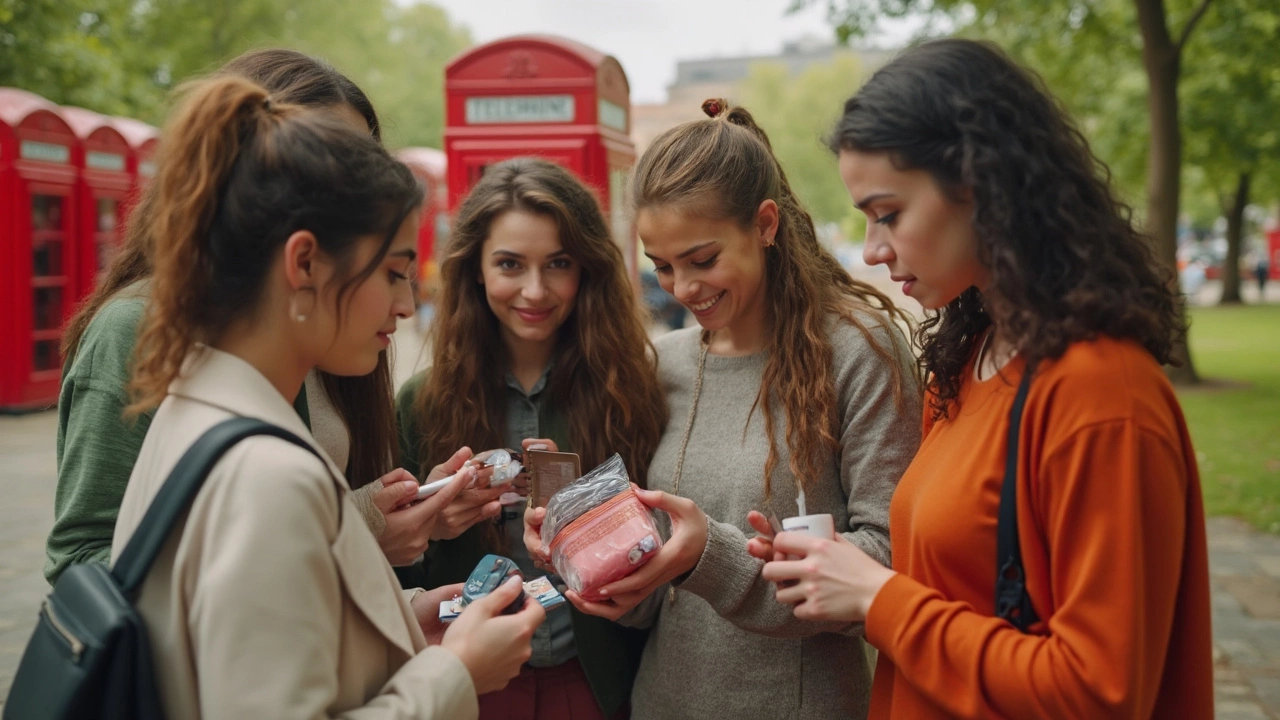Is Elf an Organic Brand? The Truth Behind Your Favorite Makeup
 Jun, 4 2025
Jun, 4 2025
Most drugstore beauty aisles are a sea of colorful Elf products, but have you ever flipped a package over and wondered, "Is this actually organic?" Scroll through Instagram and you’ll find loads of influencers tagging Elf as 'clean' or 'green', but those words are slippery. If you care about what goes on your skin, you really have to ask: does Elf check the boxes for a true organic brand or is it just really good marketing?
The lines get blurry fast in beauty. 'Organic' isn’t just a feel-good label—there’s real meaning, and certain standards a brand needs to hit. Let’s clear up the confusion around Elf’s products and ingredient lists, so you’re not left guessing. The truth matters, especially when it’s something you use every single day.
- What Does 'Organic' Really Mean for Skincare?
- Elf's Ingredient List: The Real Story
- How Elf Compares to True Organic Brands
- Tips for Finding Genuine Organic Products
What Does 'Organic' Really Mean for Skincare?
'Organic' gets thrown around a lot when it comes to beauty products, but it’s not just about tossing a leafy symbol on the label. Organic actually means ingredients that were grown without synthetic pesticides, fertilizers, genetically modified organisms (GMOs), or sewage sludge (yes, that’s a thing…). This isn’t just a marketing fad—it’s about what’s missing from those ingredients as much as what’s in them.
For a skincare product to really be called 'organic,' there’s usually a certifying body behind it—think USDA in the U.S. or COSMOS in Europe. These groups check the supply chain, from farm to face, making sure those standards are legit. If a product isn’t certified, you can’t be sure how it was made. Here’s what a USDA-certified organic label actually guarantees:
- At least 95% of the ingredients are organic by weight.
- Absolutely no synthetic preservatives, parabens, or artificial colors allowed in those 95%.
- No GMO ingredients—full stop.
| Certifying Body | Region | Organic Ingredient Requirement |
|---|---|---|
| USDA Organic | USA | 95% minimum |
| COSMOS Organic | EU | 95% minimum |
| Ecocert | Global | 95% (organic plants), 20% (total product) |
One thing worth knowing: ‘Natural’ and ‘organic’ aren’t the same. ‘Natural’ just means stuff that’s not made in a lab, but it could still be loaded with pesticides or grown with GMOs. The organic label means a whole lot more—way stricter.
“If a product isn’t clearly certified organic, you’re probably just trusting marketing claims rather than actual standards.” — EWG (Environmental Working Group)
It’s not about the packaging or a quick slogan—it’s about the real deal. So before you grab a product because it looks earthy or says ‘plant-based,’ check if there’s any official badge. When you see a legit certification, you’re not only skipping chemicals, you’re also supporting better farming for the planet.
The organic skincare scene is growing fast, too. Did you know that the global organic personal care market was valued at over $14 billion in 2023, and it’s still climbing? More people care about what’s in their moisturizer than ever before.
If you truly want to buy organic, read the ingredient list and always look for certification—or else, you’re just rolling the dice.
Elf's Ingredient List: The Real Story
Let’s get straight to it: Elf isn’t an organic brand. If you scan their ingredient lists, you’ll see chemicals like Dimethicone, PEGs, and synthetic colorants—these aren’t on any organic certification list. Organic brands have to use a high percentage of plant-based ingredients that are grown without pesticides or synthetic fertilizers. Elf doesn’t claim this, and they’re not certified by groups like USDA Organic or Ecocert.
That doesn’t mean Elf is all bad. If you grab, say, their cult-favorite Poreless Putty Primer, you’ll notice some natural things like squalane—this is a plant-based hydrator, which is great. Still, it’s mixed in with stuff created in a lab. Elf is pretty transparent about what’s inside their products, so you can always check their website for a full ingredient breakdown. But if you need products that are 100% organic or even just mostly plant-based, you’ll have to look elsewhere.
- Elf markets itself as cruelty-free and vegan, which matters to a lot of us, but those labels don’t mean organic. They might mean the brand is skipping animal by-products, but you can’t assume everything is farm-grown and pesticide-free.
- Parabens and sulfates aren’t common in Elf’s products, which is a good thing if you’re sensitive to these ingredients. But you’ll still find preservatives and fragrances that wouldn’t pass strict organic standards.
- Geek tip: if you’re checking for organic cred, look for short ingredient lists filled with things you recognize. When you see long names you can’t pronounce, odds are the formula is pretty far from organic.
- Want a quick comparison? Flip an Elf cleanser next to a certified organic brand’s cleanser. The difference is clear: organic brands brag about aloe vera, coconut oil, and essentials oils while Elf lists more synthetic stuff for shelf life and consistency.
Bottom line: Elf has some good-for-you ingredients, but they don’t fit the true definition of an organic skincare brand. They focus on making beauty affordable and accessible, not sticking to farm-to-face formulas.

How Elf Compares to True Organic Brands
So, where does Elf actually land when you put it next to brands that are certified organic? Here’s the short answer: Elf is not an organic brand. They don’t claim to be, and you won’t find that green USDA-certified organic seal on any of their products. But what does that really mean for your skin or your shopping choices?
True organic brands—think Juice Beauty, 100% Pure, or True Botanicals—use ingredients grown without synthetic pesticides or fertilizers. These brands go through third-party certification (like USDA or COSMOS) to prove it. Their ingredient lists usually read like a farmer’s market: aloe vera, rosehip oil, or chamomile flower extract.
Elf doesn’t play in this league, ingredient-wise. Their formulas often start with water, followed by safe synthetics and a mix of natural extracts here and there. There’s nothing sketchy about this if you’re just after affordability and skin tolerance, but it's a whole different ball game compared to a full-on organic label.
- Elf: Not organic, but cruelty-free and vegan. No official organic certification. Uses some natural ingredients, but mostly synthetic.
- True Organic Brands: Carry official organic seals. Most ingredients are plant-derived, grown organically, and minimally processed.
Here's a quick and honest look at how the two stack up:
| Brand | Ingredients | Organic Certification | Price Range |
|---|---|---|---|
| Elf | Mix of safe synthetics & some plant extracts | No | $3–$20 |
| Juice Beauty | Mostly organic plant-based | Yes (USDA, COSMOS) | $20–$70 |
| 100% Pure | Organic fruit/plant extracts | Yes (some products) | $15–$60 |
If you want strict organic standards, Elf isn’t it. But if your main priorities are price and cruelty-free vibes, Elf still checks some great boxes. The key is knowing the difference so you get what matters most to you.
Tips for Finding Genuine Organic Products
If you want true organic skincare, you can’t just go by what the front of the package says. Brands love using words like 'natural' or 'clean,' but those don’t actually mean anything legal. Here’s what actually helps you figure out if you’re looking at the real thing.
- Check for certification logos. Look for badges from trusted groups, like USDA Organic or Ecocert. If it just says 'organic' but doesn’t have any badge, take it with a grain of salt. Only certified products are actually held to organic standards.
- Flip to the ingredients list. The first couple of ingredients make up most of the product, so see if those are plant-based or have the word 'organic' next to them. 'Certified organic aloe vera,' for example, is clear. If water or a chemical is first and there’s nothing organic up top, it’s not really an organic formula.
- Watch out for the word 'derived.' 'Coconut-derived cleanser' might just mean the original molecule came from coconut a long way back, but it’s gone through a lot of lab processing since. That doesn’t mean it’s organic now.
- Be wary of price. Real organic ingredients, especially in skincare, cost more. If something labeled 'organic' is super cheap, it’s probably not legit.
Don’t forget to do a quick Google search on the brand. Some brands will lay out their sourcing, certifications, and ingredient breakdowns on their site. If it’s hard to find real info or third-party testing, they’re probably not truly organic. Transparency is usually a good sign you’re dealing with an authentic brand.
At the end of the day, if having truly organic skincare matters to you, skip the buzzwords and marketing. Focus on actual certifications, read your ingredient lists, and question claims that feel too good to be true. That’s how you cut through the noise and find real organic skincare.
